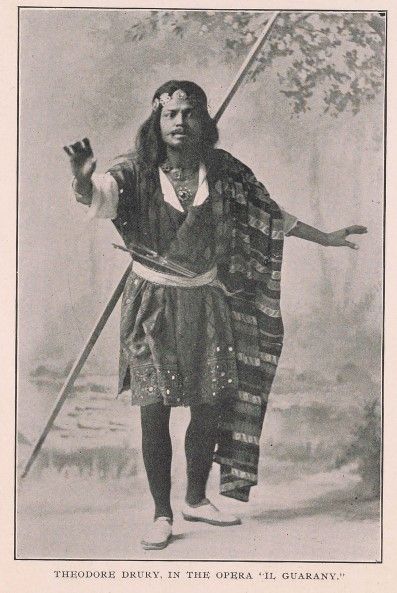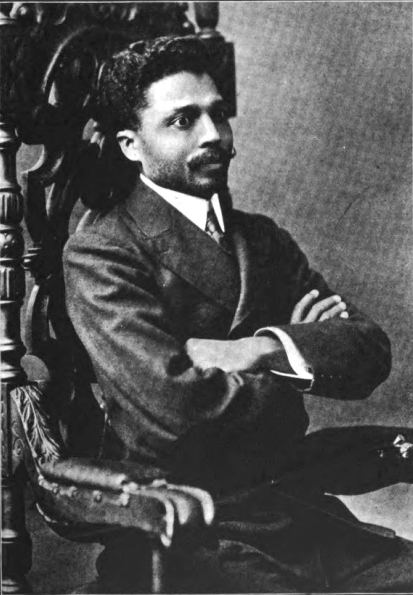It was in New York and the New England states that Drury's early performing experience as a tenor took place, often in support of more established singers. Through these appearances his name became known and in 1889 he organized the Drury Colored Opera Company. Toward the end of that same year, the company was renamed the Theodore Drury Opera Company and gave concerts of operatic selections under the management of G.H. Barrett. An advertisement in 1889 (New York Age, October 5) stated that the company owned its costumes, scenery, and decorations, and included 15 singers, a musical director, and a pianist. Drury continued his solo concert performances when he was not occupied with the opera company. In the 1895-1896 season he toured 100 cities in the U.S. giving solo recitals under the management of Alexander Concert Company.
In 1900, as a singer and director of the Theodore Drury Opera Company, Drury began a series of semiprofessional annual presentations of operas in New York, Boston, Rhode Island, and Philadelphia. Given regularly from 1900 to 1910, these performances continued sporadically into the 1930s. In defiance of the strongly entrenched concept that blacks could not perform in this medium, Drury adhered mainly to the standard grand opera repertory of the day. In the first six years George Bizet's Carmen (1900 and 1905), Carlo Gome's Il Guarany (1901), Charles Francois Gounod's Faust (1902), Guiseppe Verdi's Aida (1903), Pietro Mascagni's Cavalleria Rusticana, and Ruggero Leoncavallo's I Pagliacci (1904). The 1900 Carmen was hailed as the first successfully executed performance of its kind (Colored American Magazine, June 1900): the cast was composed predominately of blacks, and the opera was presented in English. At one point Drury felt sufficiently encouraged by his success to consider building an opera house for members of his race and advertised stock in such a project, but this dream was never realized.
Because of the stereotypes ingrained in the minds of white Americans in the wake of the minstrel shows, few were willing to consider blacks in serious roles at the turn of the century. There was no place for blacks in white opera companies, and the only sustained effort at operatic production among blacks up to this time had been made by the Colored Opera Company of Washington, D.C., (1872-1873), whose repertory consisted of only one operetta. Hence, Drury's endeavor required some breadth of imagination and depth of conviction.
He ran a music studio in Boston ... later he moved to Philadelphia, where he also taught music.
He did not give up his original love, however; as late as May 1938 he produced Carmen in Philadelphia.
Theodore and Josephine (Lindy) Drury, were married up until the time of his death. He died in Philadelphia of a myocardial infarction on March 3, 1945 at the age of 67 and is buried in Rolling Green Cemetery in West Chester, Pennsylvania.
His wife died in 1960. The couple had three daughters and two sons.
It was in New York and the New England states that Drury's early performing experience as a tenor took place, often in support of more established singers. Through these appearances his name became known and in 1889 he organized the Drury Colored Opera Company. Toward the end of that same year, the company was renamed the Theodore Drury Opera Company and gave concerts of operatic selections under the management of G.H. Barrett. An advertisement in 1889 (New York Age, October 5) stated that the company owned its costumes, scenery, and decorations, and included 15 singers, a musical director, and a pianist. Drury continued his solo concert performances when he was not occupied with the opera company. In the 1895-1896 season he toured 100 cities in the U.S. giving solo recitals under the management of Alexander Concert Company.
In 1900, as a singer and director of the Theodore Drury Opera Company, Drury began a series of semiprofessional annual presentations of operas in New York, Boston, Rhode Island, and Philadelphia. Given regularly from 1900 to 1910, these performances continued sporadically into the 1930s. In defiance of the strongly entrenched concept that blacks could not perform in this medium, Drury adhered mainly to the standard grand opera repertory of the day. In the first six years George Bizet's Carmen (1900 and 1905), Carlo Gome's Il Guarany (1901), Charles Francois Gounod's Faust (1902), Guiseppe Verdi's Aida (1903), Pietro Mascagni's Cavalleria Rusticana, and Ruggero Leoncavallo's I Pagliacci (1904). The 1900 Carmen was hailed as the first successfully executed performance of its kind (Colored American Magazine, June 1900): the cast was composed predominately of blacks, and the opera was presented in English. At one point Drury felt sufficiently encouraged by his success to consider building an opera house for members of his race and advertised stock in such a project, but this dream was never realized.
Because of the stereotypes ingrained in the minds of white Americans in the wake of the minstrel shows, few were willing to consider blacks in serious roles at the turn of the century. There was no place for blacks in white opera companies, and the only sustained effort at operatic production among blacks up to this time had been made by the Colored Opera Company of Washington, D.C., (1872-1873), whose repertory consisted of only one operetta. Hence, Drury's endeavor required some breadth of imagination and depth of conviction.
He ran a music studio in Boston ... later he moved to Philadelphia, where he also taught music.
He did not give up his original love, however; as late as May 1938 he produced Carmen in Philadelphia.
Theodore and Josephine (Lindy) Drury, were married up until the time of his death. He died in Philadelphia of a myocardial infarction on March 3, 1945 at the age of 67 and is buried in Rolling Green Cemetery in West Chester, Pennsylvania.
His wife died in 1960. The couple had three daughters and two sons.



